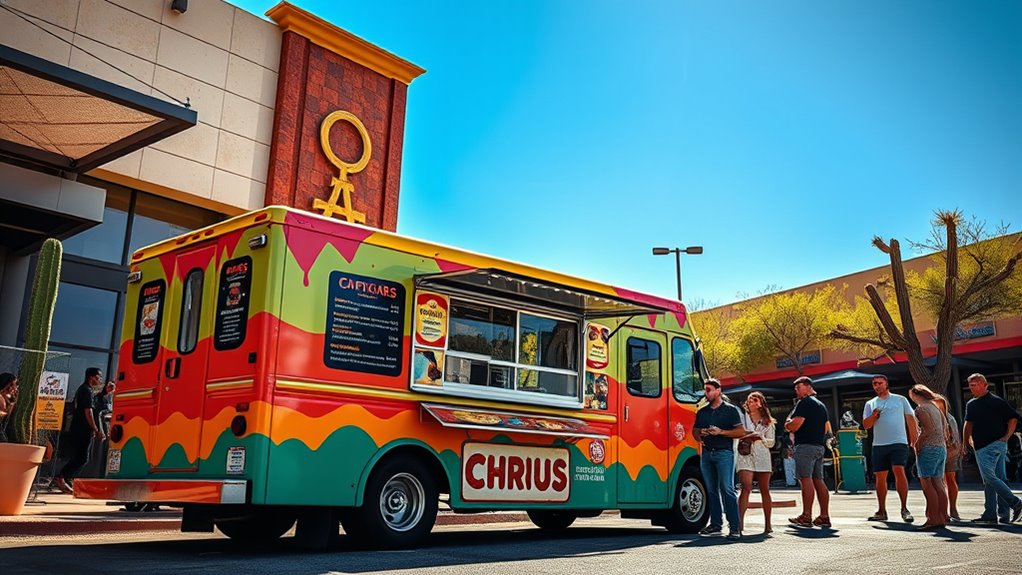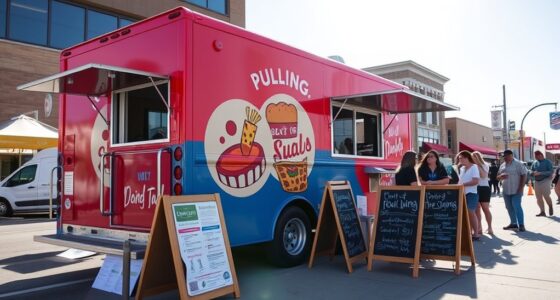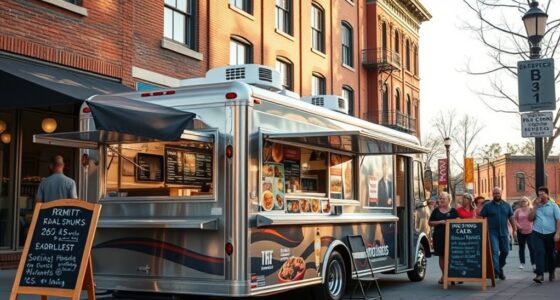To open a food truck in Mesa, Arizona, you’ll need permits like a state license, county permit, and city license, costing around $120 to over $600 annually. Choose busy, compliant locations such as parks or festivals while avoiding residential zones. Plan your menu to meet safety standards and keep it simple, and boost business through social media marketing. Following safety, zoning, and licensing rules is essential—continue exploring how to keep your operation smooth and successful.
Key Takeaways
- Obtain necessary permits including State License, Maricopa County Mobile Food Permit, and Mesa Mobile Food Vendor License, and display them visibly.
- Vehicle costs range from $30,000 to $175,000, with additional expenses for equipment, permits, insurance, and monthly operational costs.
- Operate in high-traffic public areas like parks, festivals, and downtown zones, ensuring compliance with zoning laws and site permissions.
- Develop and submit a menu and Food Safety Operation Plan, focusing on safe, quick-serve foods with proper storage and sanitation practices.
- Use social media platforms like Facebook for marketing, engaging customers with content, promotions, and responding promptly to inquiries.
Navigating Permits and Licensing Requirements in Mesa
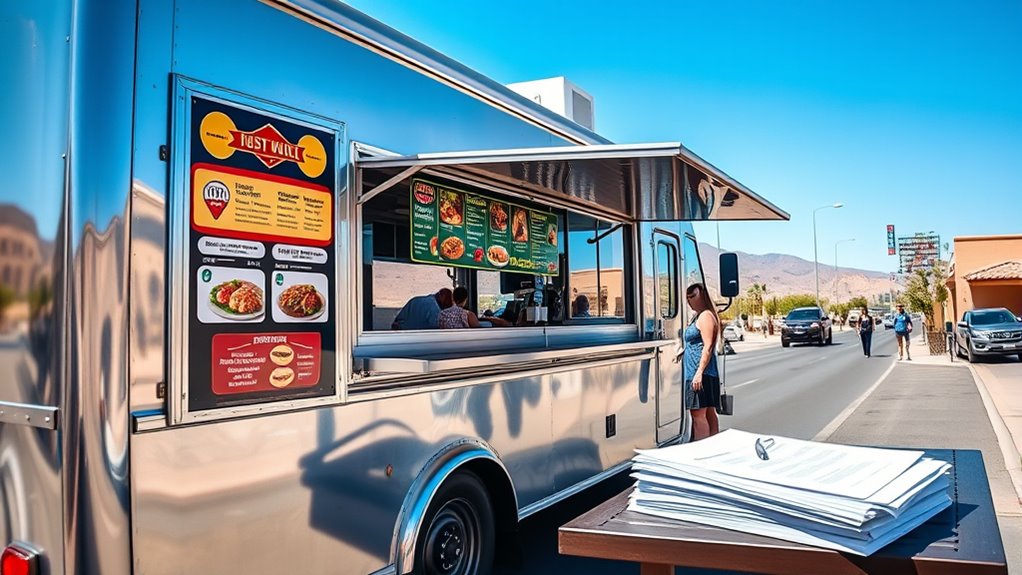
Are you unsure where to start when it comes to obtaining permits and licenses for your food truck in Mesa? First, you need a State License for your mobile food unit, which is mandatory across Arizona. Then, since you’re operating in Maricopa County, you’ll require the County’s Mobile Food Establishment Permit, with types based on your service scope—costs range from about $120 to $610 annually. Additionally, you must secure a Mesa Mobile Food Vendor License, which takes 2 to 4 weeks to process. All permits and licenses must be displayed prominently on your truck during operation. Be prepared to submit documents like a business license, TPT license, insurance proof, vehicle registration, and health permits. The State License is required regardless of your specific location within Arizona. Staying compliant with local zoning, health, and fire regulations is essential for smooth operation, and understanding home decor regulations can help ensure your truck’s design aligns with local aesthetic standards.
Budgeting for Your Food Truck Venture: Costs and Expenses
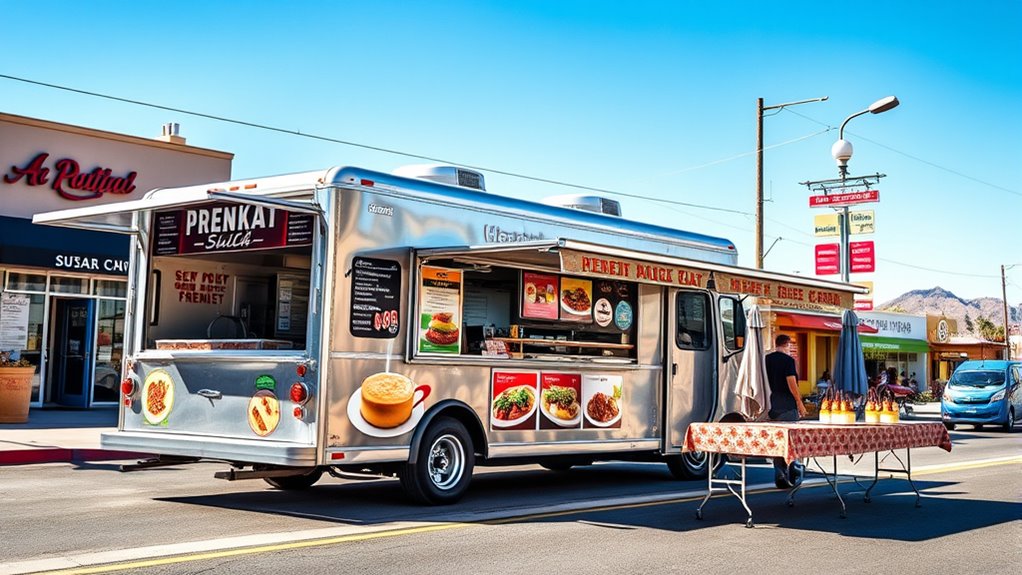
Planning your food truck’s budget involves understanding the various costs you’ll face from the start. Vehicle costs vary: custom trucks range from $50,000 to $175,000, while used trucks can be $30,000 to $70,000. Monthly rental options typically cost $2,000 to $4,000. Essential kitchen appliances like refrigerators and fryers add $10,000 to $30,000, plus $2,000 to $3,000 for initial inventory. Licensing and permits include a $10 business license, a $100 mobile vendor license, and food truck permits averaging around $1,864. Insurance costs are $2,000 to $4,000 annually. Operational expenses like fuel, maintenance, and commissary fees range from $500 to $2,500 monthly. Location-specific permit and license fees can significantly impact your overall startup budget, especially in cities with higher regulatory costs. Marketing investments may include branding, digital marketing, and event participation.
| Cost Type | Range | Notes |
|---|---|---|
| Vehicle | $30,000–$175,000 | New or used |
| Kitchen Equipment | $10,000–$30,000 | Appliances and supplies |
| Licensing & Permits | $10–$1,864 | Varies by city |
| Insurance | $2,000–$4,000 annually | Covers liability and equipment |
| Monthly Expenses | $500–$2,500 | Fuel, maintenance, commissary |
Identifying Approved Locations for Mobile Food Operations
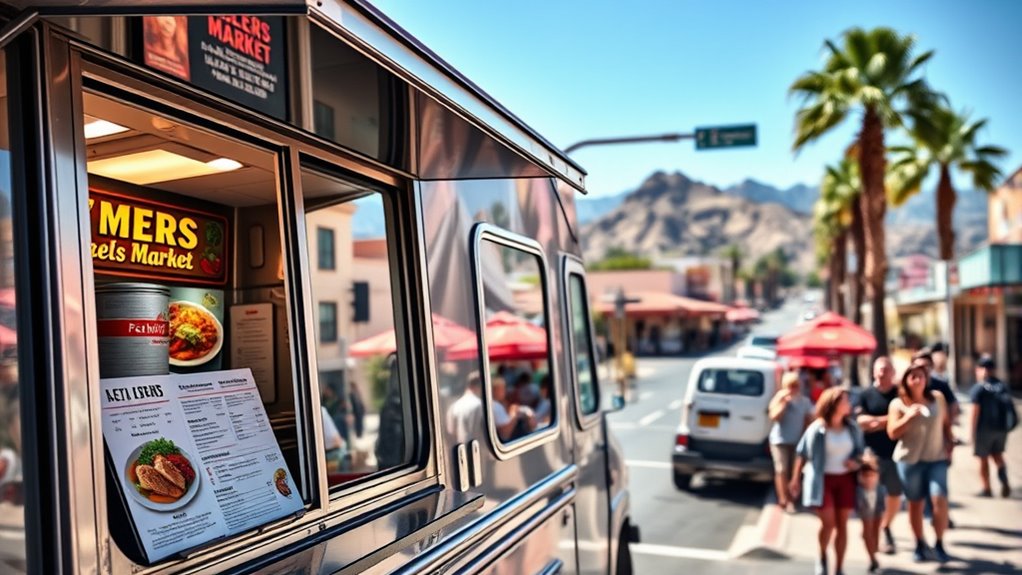
To operate legally and successfully, you need to identify approved locations where your food truck can park and sell. Mesa’s city code restricts mobile vendors to specific spots, guaranteeing public health and safety. Here’s how to find the right locations:
Operating legally requires identifying approved locations for your food truck in Mesa to ensure safety and compliance.
- High-traffic public spaces like parks and downtown Mesa draw crowds eager for your offerings.
- Popular event venues and festivals offer licensed spots with built-in audiences.
- Food truck clusters or hotspots foster community and increase customer flow.
- Commercial districts and neighborhoods attract foot traffic, but ensure you have the necessary permits.
- Developing a clear leadership strategy for your food truck business will help you navigate regulations and build a strong brand presence in your chosen locations.
Always verify your chosen location complies with licensing requirements and restrictions. Early planning and understanding city ordinances help you avoid fines and guarantee steady sales.
Crafting a Menu That Meets Regulations and Customer Tastes
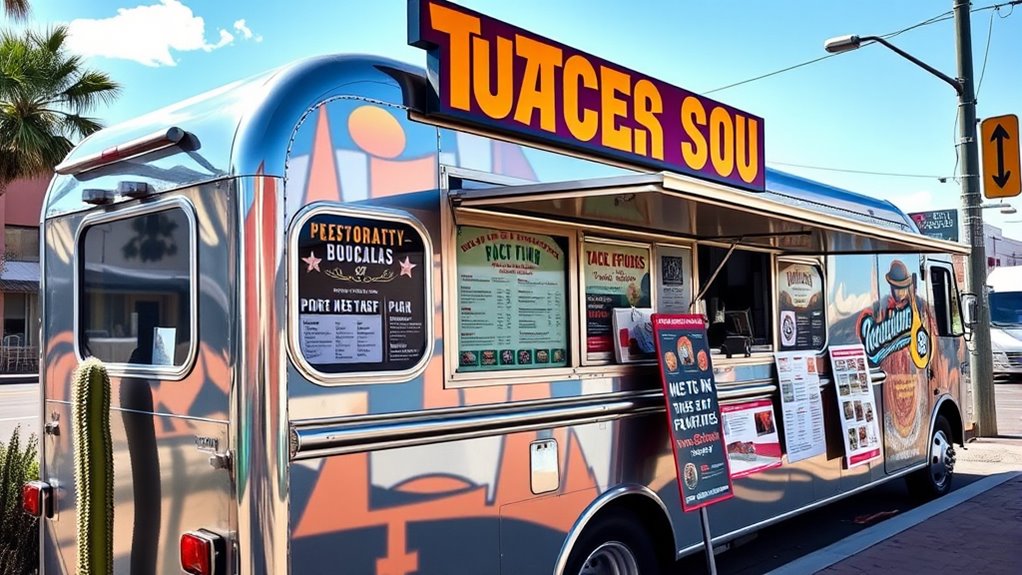
Creating a menu that balances regulatory requirements with customer preferences is key to running a successful food truck in Mesa. Your menu must comply with Mesa City Code Title 5, Chapter 4, which regulates food safety and handling. Depending on your license type—Type I, II, or III—there are restrictions on raw animal foods and preparation levels. You’ll need to submit your menu and Food Safety Operation Plan for approval during the application process and update them if changes occur. Focus on items that are easy to prepare, quick to serve, and safe under your license. Prioritize prepackaged, heated, or cold-holding foods, using equipment that meets safety standards. Keeping menus simple, appealing, and compliant helps streamline operations and fosters customer satisfaction. Additionally, understanding and addressing food safety regulations is essential to prevent contamination and ensure customer trust.
Effective Marketing Strategies to Grow Your Food Truck Business
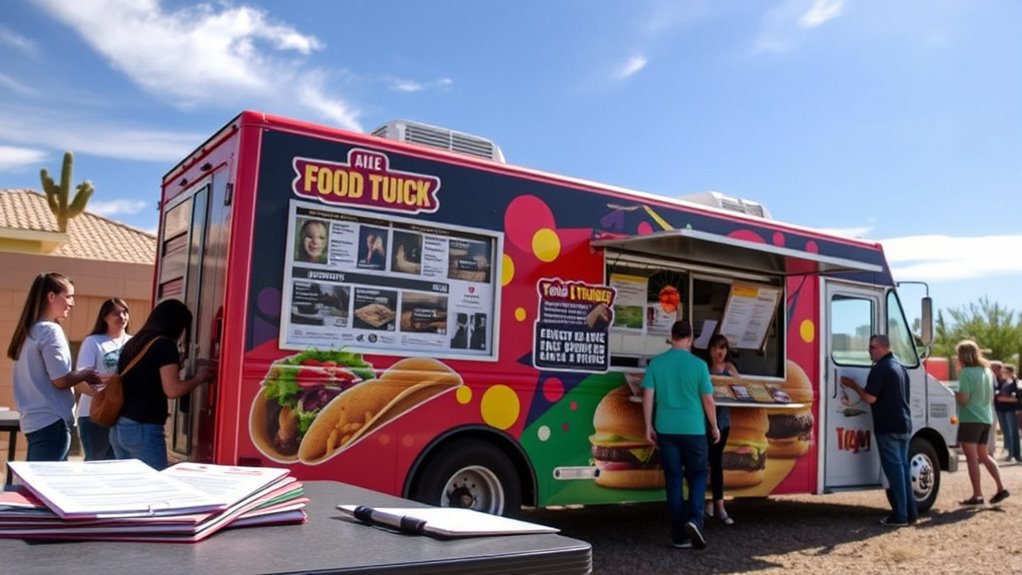
Leveraging social media platforms is one of the most effective ways to increase your food truck’s visibility and attract new customers. With 68% of food truck owners actively promoting online, it’s essential to harness this power. Facebook is especially crucial, with 75% of trucks engaging there, helping you build a loyal community. Digital campaigns can boost your sales by 20%, turning followers into paying customers. Around 40% of people discover their favorite trucks through social media ads, making it an indispensable customer acquisition tool. Additionally, active engagement encourages customers to spend about 15% more, increasing loyalty and revenue. Focus on these strategies:
Social media boosts food truck visibility, customer loyalty, and sales through engaging content and targeted campaigns.
- Create eye-catching posts and videos.
- Run targeted promotions.
- Share behind-the-scenes content.
- Respond promptly to followers to foster loyalty.
Furthermore, incorporating social media analytics can help you understand your audience better and tailor your content for even greater engagement. Utilizing market trends can also inform your advertising strategies, ensuring you stay competitive and aligned with current consumer interests.
Ensuring Compliance and Best Practices for a Smooth Operation
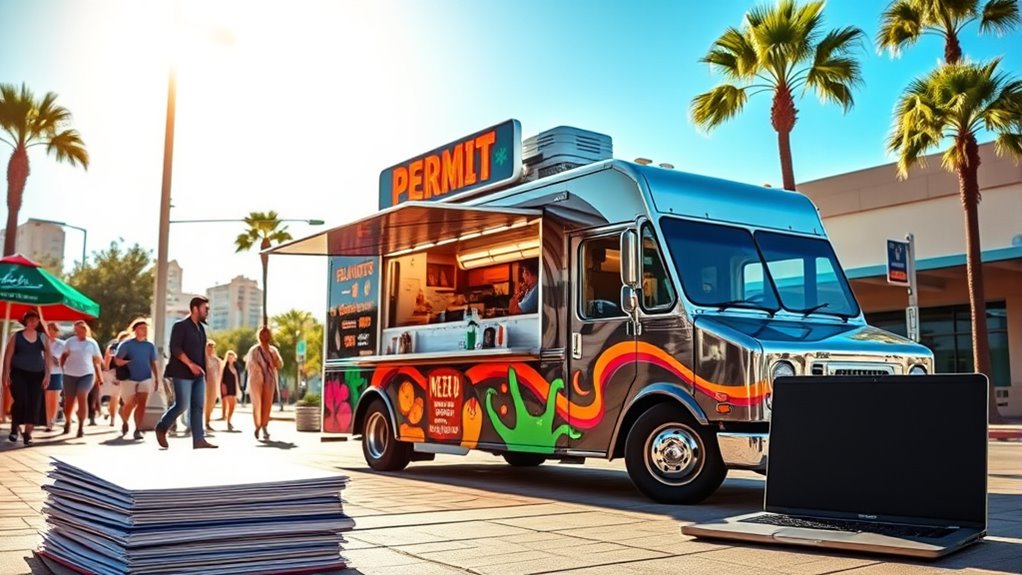
To keep your food truck running smoothly in Mesa, you need to stay on top of licensing, permits, and safety standards. Make sure you have all necessary documentation, like insurance and permits, organized and up to date. Regular record-keeping helps you quickly address compliance issues and avoid costly penalties. Staying informed about any regulatory updates is also crucial to ensure ongoing compliance and avoid unexpected violations. Additionally, understanding hybrid vehicle best practices can help optimize your operational efficiency and reduce costs.
Regulatory Adherence Strategies
Ensuring regulatory adherence is essential for a food truck’s smooth operation in Mesa, and it starts with understanding the specific licensing and permit requirements. You must secure a Mesa Mobile Food Vendor License and a Maricopa County Permit, and keep up with annual fire inspections. To stay compliant, you should:
- Regularly review and follow Mesa City Code Title 5, Chapter 4, on safety and sanitation.
- Confirm your operation sites meet zoning restrictions, especially avoiding residential zones within 250 feet.
- Display permits visibly during all hours of operation, ensuring inspectors and customers see them.
- Maintain strict health standards, including sanitation, proper food storage, and temperature controls, to prevent violations. Failure to adhere to these regulations can lead to fines or suspension of your license.
Staying proactive with these steps guarantees your truck remains compliant and avoids costly penalties.
Documentation and Record-Keeping
Maintaining thorough documentation and accurate records is essential for keeping your food truck compliant with local regulations in Mesa. You should keep copies of your Arizona Department of Transportation vehicle registration for each unit and display your City business license clearly near the service window. Retain all health permits from the Arizona Department of Health Services or county authorities, along with evidence of recent fire inspections. Ascertain your insurance certificate is valid, meeting city standards, and issued by a reputable insurer. Keep detailed records of transactions, supplies, and sales, and perform regular self-audits to stay current. Organize permits, inspection reports, insurance documents, and location agreements systematically—using digital backups when possible—to streamline compliance and safeguard your operation. Additionally, insurance documentation should be updated annually and stored securely to ensure continuous coverage and quick access during inspections. Recognizing and adhering to regulatory requirements can prevent costly violations and keep your operation running smoothly.
Frequently Asked Questions
How Long Does the Entire Mobile Food Truck Permit Approval Process Typically Take?
The entire mobile food truck permit approval process usually takes about 2 to 6 weeks, depending on several factors. You should submit a complete application, including all required documents, and schedule health and fire inspections promptly. Expedited services can shorten the timeline to 5-10 business days, but delays often occur if applications are incomplete or inspections fail. Planning ahead guarantees you meet your operation start date without unnecessary setbacks.
Are There Specific Zoning Restrictions for Operating in Residential Neighborhoods in Mesa?
You should know that Mesa has zoning restrictions limiting food truck operations near residential neighborhoods. Specifically, you can’t operate within 250 feet of residential land to keep neighborhoods peaceful. This means you’ll need to carefully choose locations outside this zone. Attempting to operate closer can lead to violations and potential fines. Always check with local authorities to confirm your chosen spot complies with these distance requirements before setting up your truck.
Can I Operate My Food Truck Year-Round in Mesa or Are There Seasonal Restrictions?
You can operate your food truck year-round in Mesa without seasonal restrictions, as long as you have the necessary permits, like the Mobile Food Vendor License. Mesa’s regulations don’t limit your operation based on seasons, but you must comply with parking, zoning, and health standards. Keep your permits current, follow city rules, and confirm location-specific regulations to make certain of smooth year-round operation.
What Types of Insurance Coverage Are Recommended for Food Truck Owners in Mesa?
Imagine facing a disaster that could wipe out your entire food truck empire in seconds—without the right insurance, that’s a real nightmare. You need commercial auto insurance to cover your truck and towing vehicle, general liability to protect against accidents, property insurance for your equipment, and workers’ compensation if you hire staff. These policies safeguard your business, giving you peace of mind to focus on serving delicious food and growing your dream.
Are There Any Specific Health Code Requirements for Alcohol or Beverage Sales From a Food Truck?
You need to follow specific health code requirements when selling alcohol or beverages from your food truck. This includes passing health inspections for sanitation, proper storage, and safe serving practices. You must keep your permits visible, ensure your equipment is clean, and serve beverages at safe temperatures. Regular inspections by local authorities ensure you’re complying with health standards, and maintaining detailed sales records is necessary for audits and tax reporting.
Conclusion
Starting your food truck in Mesa can be exciting, but it’s essential to stay compliant and strategic. By understanding permits, budgeting wisely, choosing the right locations, crafting a tasty menu, and marketing effectively, you’ll set yourself up for success. Are you ready to turn your food truck dream into reality? Remember, staying organized and informed makes all the difference—so take the time to plan and execute each step confidently. Your culinary adventure in Mesa starts now!
